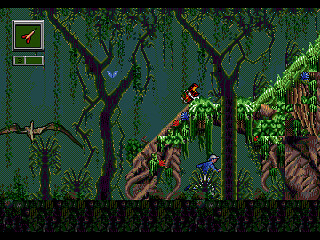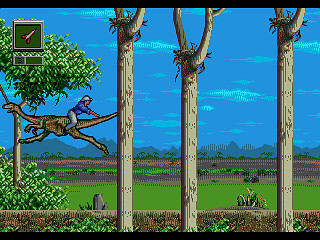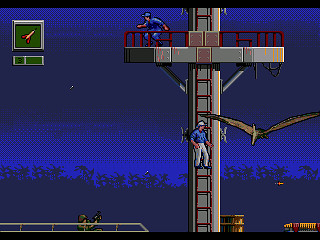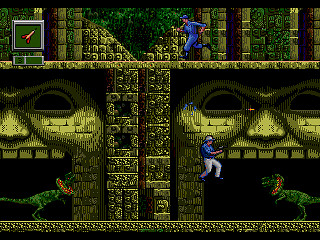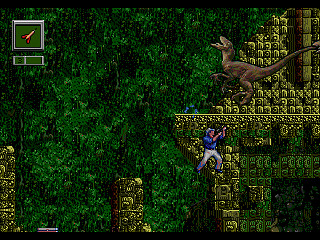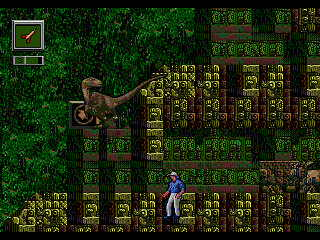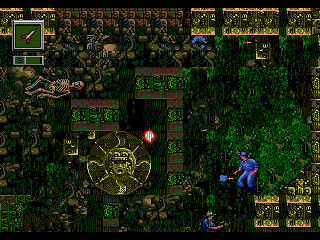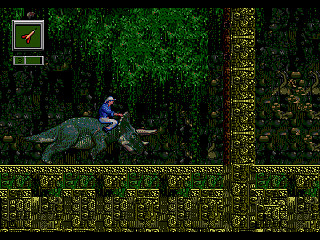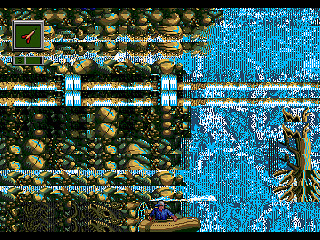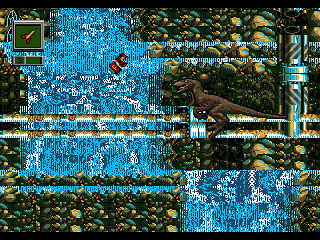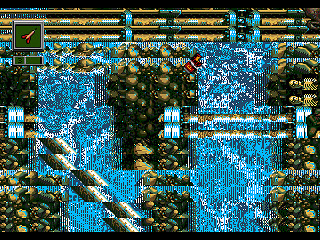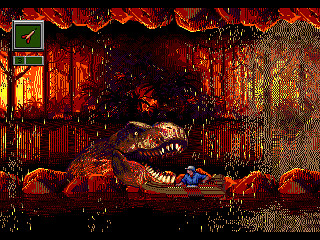Game objectives
- Emulator used: Gens Rerecording v11c (then converted as BizHawk 2.3 movie file)
- Uses hardest difficulty
- Heavy glitch abuse
- Major skip glitch
- Takes damage to save time
- Contains speed/entertainment tradeoffs
- Genre: Platform
- Colors a dinosaur
About the Game
Jurassic Park: Rampage Edition is a side-scrolling platformer developed by BlueSky Software and published by Sega for the Sega Genesis 1994. It is the sequel to Sega's
previous Jurassic Park video game, based on the film of the same name.
In this game, you also can choose between Dr. Grant and the Raptor. Dr. Grant is able to complete game much faster than Raptor due many heavy glitches.
Paleontology
Before we start, world-famous paleontologist Dr. Alan Grant would like say a few words about dinosaurs represented in this game.
- Pteranodon (meaning "toothless wing" in Greek) is a genus of pterosaur that included some of the largest known flying reptiles, with wingspans over 6 metres. They lived during the late Cretaceous geological period. More fossil specimens of Pteranodon have been found than any other pterosaur, with about 1,200 specimens known to science, many of them well preserved with nearly complete skulls and articulated skeletons. By the way pteranodon were pterosaurs, not dinosaurs.
- Gallimimus is a genus of theropod dinosaur that lived during the Late Cretaceous period, about 70 million years ago. Gallimimus is the largest known ornithomimid; adults were about 6 metres long, 1.9 metres tall at the hip and weighed about 440 kilograms. As evidenced by its relative Ornithomimus, it would have had feathers. Many of the vertebrae had openings that indicate they were pneumatic (air-filled). The neck was proportionally long in relation to the trunk. The hands were proportionally the shortest of any ornithomimosaur and each had three digits with curved claws. The forelimbs were weak while the hindlimbs were proportionally long. The head was small and light with large eyes that faced to the sides. The snout was long compared to other ornithomimids, although it was broader and more rounded at the tip than in other species. Gallimimus was toothless with a keratinous (horny) beak, and had a delicate lower jaw.
- Dilophosaurusis a genus of theropod dinosaur that lived during the Early Jurassic, about 193 million years ago. The genus name means "two-crested lizard". At about 7 meters in length, with a weight of about 400 kilograms. Dilophosaurus was one of the earliest large predatory dinosaurs, though it was smaller than some later theropods. It was slender and lightly built, and the skull was proportionally large, but delicate. The snout was narrow, and the upper jaw had a gap or kink below the nostril. It had a pair of longitudinal, plate-shaped crests on its skull, similar to a cassowary with two crests. The mandible was slender and delicate at the front, but deep at the back. The teeth were long, curved, thin, and compressed sideways. Those in the lower jaw were much smaller than those of the upper jaw. Most of the teeth had serrations at their front and back edges. The neck was long, and its vertebrae were hollow, and very light. The arms were powerful, with a long and slender upper arm bone. The hands had four fingers: the first was short but strong and bore a large claw, the two following fingers were longer and slenderer with smaller claws, and the fourth was vestigial. The thigh bone was massive, the feet were stout, and the toes bore large claws.
- Compsognathus is a genus of small, bipedal, carnivorous theropod dinosaur. Members of its single species Compsognathus longipes could grow to around the size of a turkey. They lived about 150 million years ago, during the Tithonian age of the late Jurassic period. Compsognathus had highly developed senses and quick legs; had 68 sharp, slightly curved teeths.
- Velociraptor (meaning "swift seizer" in Latin) is a genus of dromaeosaurid theropod dinosaur that lived approximately 75 to 71 million years ago during the latter part of the Cretaceous Period. It was a bipedal, feathered carnivore with a long tail and an enlarged sickle-shaped claw on each hindfoot, which is thought to have been used to tackle and disembowel prey. Velociraptor can be distinguished from other dromaeosaurids by its long and low skull, with an upturned snout. Velociraptor (commonly shortened to "Raptor") is one of the dinosaur genera most familiar to the general public due to its prominent role in the Jurassic Park motion picture series. In real life, however, Velociraptor was roughly the size of a turkey.
- Triceratops is a genus of herbivorous ceratopsid dinosaur that first appeared during the late Maastrichtian stage of the late Cretaceous period, about 68 million years ago. It is one of the last known non-avian dinosaur genera, and became extinct in the Cretaceous–Paleogene extinction event 66 million years ago. The name Triceratops literally means "three-horned face". Bearing a large bony frill and three horns on its large four-legged body, and possessing similarities with the modern rhinoceros, Triceratops is one of the most recognizable of all dinosaurs and the best known ceratopsid. The functions of the frills and three distinctive facial horns on its head have long inspired debate. Traditionally, these have been viewed as defensive weapons against predators. More recent theories, noting the presence of blood vessels in the skull bones of ceratopsids, find it more probable that these features were primarily used in identification, courtship and dominance displays, much like the antlers and horns of modern reindeer, mountain goats, or rhinoceros beetles.
- Tyrannosaurus is a genus of coelurosaurian theropod dinosaur. It is one of the most well-represented of the large theropods. Tyrannosaurus had a much wider range than other tyrannosaurids. Fossils are found in a variety of rock formations dating to the Maastrichtian age of the upper Cretaceous Period, 68 to 66 million years ago. It was the last known member of the tyrannosaurids, and among the last non-avian dinosaurs to exist before the Cretaceous–Paleogene extinction event.
Level by Level walkthrough
Aviary
To fly with pteranodon? No thanks.
Savannah
Not so easy to ride on unbroken gallimimus. It suddenly turn to be real rodeo show from Jurassic Park. At first Dr. Grant almost fell and hung on the tail at very last moment. And then he ride i wrong direction. This way is possible to overflow X-position address and exit from level much earlier than intended.
Cargo Ship
Used zip under the ladder to skip major part of level. During zip glitch is important to interrupt zip at very last frame to be able make a jump from intermodal containers without delay. This level is short, but tricky to optimize because it very laggy.
Hidden Ruins
The only one normal level where Dr. Grant is able to demonstrate his jumping skills.
Optimal movement system is constant jumping and shooting. Shooting is necessary to maintain max speed in air. Jumping cause a lot of problems. All jumps at full speed have same size, so optimal path is very limited, and you can't simply to run a little bit between jumps to adjust position (or will lost many frames). If Dr. Grant will get a hit in the air it will stop him, so such jumping movement require careful enemy behaviour manipulation to avoid all hits. Also if shoot too many times game can lag, so needs to doing it a right frames to avoid lags.
In the middle of level used help of Raptor to get a zip to skip part of route.
Ride triceratops at the end.
River Run
Dr. Grant is not big expert at boating in strong currents. He fall down on the first waterfall...
Dr. Grant miraculously survived after such dangerous falling and finally reach calm water. What can go wrong now?
Oh no... it is tyrannosaurus!
END
Regarding entertainment tradeoffs
This is superhuman playing session, it mean having fun in progress. So movie includes a few small speed/entertainment tradeoffs (about 1 second in total): One non necessary jump to hung on the tail of Gallimimus in Savannah. 1 frame to take additional chocolate item in Hidden Ruins. Also at very last frame of River Run if make turn boat in normal direction is possible to stopped input 6 frames earlier, however this possibility was ignored becouse of Dr. Grant consider that moving backward is looking cooler.
Possible improvements
I suspect that in Hidden Ruins can be somehow to manipulate Raptor to get a zip earlier. Advanced strategy is to shot him in air to make him fall down on correct platform with no extra jump required, i managed to do it many times, however after it i was not able to activate zip, if this is possible - up to 100 frames can be saved.
Difficulty can be changed to hard 1 frame earlier, even if we don't see it on screen.
Special thanks
XTREMAL93, Sk1pBaSe, Reanymation
Suggested screenshots
ThunderAxe31: Replacing movie file with a version converted for BizHawk 2.3. All inputs are unchanged.
This movie uses the known RTA zips for beating each level astonishingly fast. The techniques are correctly applied and optimized, which puts this run out of the league of RTA attempts, as of the current knowlege for this game.
While this game is presented as an enhanced version of
Jurassic Park for Genesis, it does feature such difference in both aesthetics and gameplay that it should be considered as a different game under any circumstance.
The audience reception was very welcoming, so this submission is accepted for Moons.
